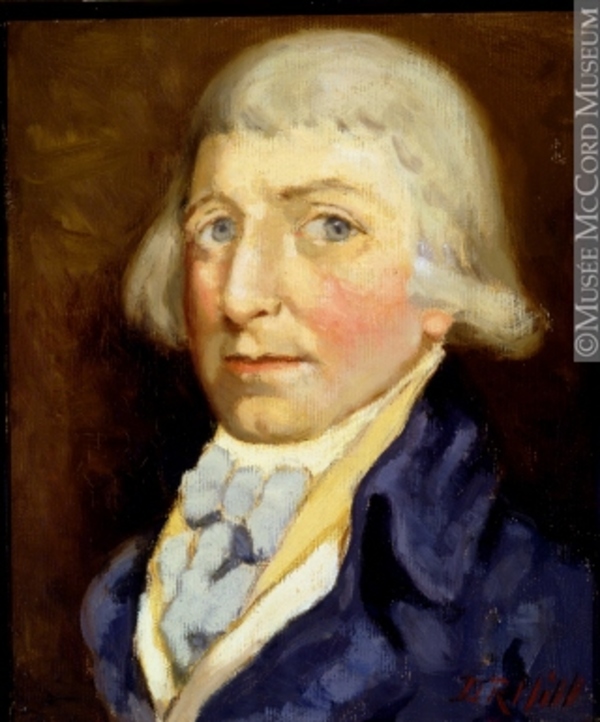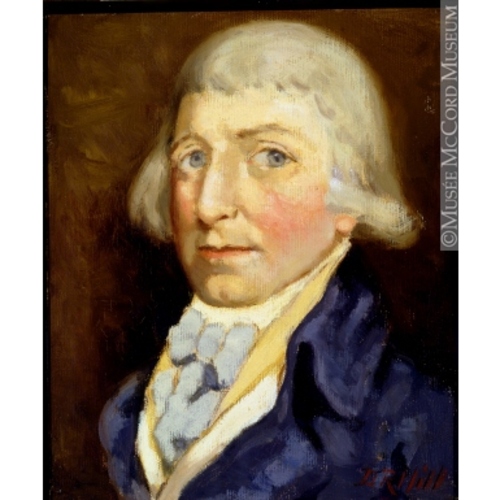
Source: Link
FROBISHER, BENJAMIN, fur-trader; b. c. 1742, probably in Halifax, England, son of Joseph Frobisher and Rachel Hargrave; d. 14 April 1787 in Montreal (Que.).
Benjamin Frobisher apparently immigrated to Canada with his brother Joseph* around 1763, and their brother Thomas joined them about 1769. The lives of all three became linked with the fur trade and its expansion into the northwest. They developed this orientation at a time when most fur-traders were based at Niagara, Detroit, or Michilimackinac (Mackinaw City, Mich.) and traded actively in the Illinois country. The brothers’ initial investments, between 1764 and 1768, took them into the Lake Superior region. They were traders who would in time reach top rank and who acted both in concert and apart, and like many others they sought partnerships to share the risks of their ventures. They joined forces financially from time to time with such men as James McGill*, Isaac Todd*, Richard Dobie*, Charles Paterson, and Thomas Corry, and they did not hesitate to go security for other fur-traders, whether French or English speaking. The same complexity of relationships existed in the expeditions themselves: thus in 1765 Benjamin Frobisher was John Welles’s partner; then in 1769, when the Frobisher brothers decided to extend their trade beyond Lake Superior, they took part with Richard Dobie in a small venture of one canoe, eight crew, and goods worth £500. Although on this occasion the expedition was stopped by the Indians at Rainy Lake, the brothers made afresh attempt the following year, still in partnership with Dobie, and the expedition went well beyond Fort Bourbon, at the mouth of the Saskatchewan River, with three canoes, 18 men, and goods worth £1,200.
A division of labour was soon established among the Frobisher brothers; any business that was to expand could not depend on one man both to organize and to lead trading ventures. Within the enterprise, which was largely a family one, Benjamin was the organizer and administrator. He managed the business in general, dealt with importers and suppliers in England, and saw to financing and to the hiring of personnel, who, he noted one year, live “in the parish of Laprairie and are farmers by occupation.” From 1771 on he seems to have been in partnership solely with his brothers, who undertook to work in the field. In 1772, with six canoes and 45 men, they apparently reached the Red River and the following year they got to the Saskatchewan. Two years later Benjamin organized an expedition of four canoes and 30 men.
There was intense competition among traders in the 1770s, whether they were on their own or in small partnerships. This rivalry caused numerous problems: it increased costs and stimulated territorial expansion which in turn caused fresh expenses and resulted in decreasing profits. The American revolution occasioned a scarcity of trade goods and set off an inflation that threatened the existence of small enterprises. In 1775 the Frobishers had joined with James McGill and Maurice-Régis Blondeau* in outfitting 12 canoes and a crew of about 103. They reached Grand Portage (near Grand Portage, Minn.) and afterwards formed a coalition with others to exploit the resources of the northwest. Benjamin and Joseph later explained: “Taught . . . by experience that separate Interests were the Bane of that Trade, we lost no time to form . . . a Company.” In connection with the event Matthew Cocking, the Hudson’s Bay Company’s master at Cumberland House (Sask.), noted in his journal after a visit by Joseph Frobisher and Alexander Henry* the elder: “French Laws having been established in Canada last April [1775] they suspect the Pedling Business will be confined to few hands as in the French time and consequently that the present Quantities of Furrs Yearly carried down will be much deminished tho’ the Profitts accruing will be much greater in proportion.” Whether this forerunner of the North West Company survived more than one season is not known. The tendency towards combination was nevertheless established, and the war helped to reinforce it.
In 1779 the Frobishers set up a company with Charles Paterson and outfitted a large expedition. This company owned two of the 16 shares in the North West Company established that year, whose total investment comprised a flotilla of 43 canoes, 367 men, and merchandise worth £20,920. In 1781 Isaac Todd and James McGill replaced Paterson as partners in the Frobishers’ enterprise. The years 1781–84 seem to have been difficult for the brothers because competition remained keen in the northwest. New agreements made by the partners of the NWC in 1783 suggest both a change in personnel and a reinforcement of the Frobishers’ position, as well as that of Simon McTavish*. The partners were conscious of the dangers posed by Britain’s surrender of the posts in the Great Lakes region to the Americans by the treaty of Versailles (1783). Worried that Americans might seize possession of their trade and harvest the fruits of their labours, they sent Edward Umfreville and Venance Lemaire, dit Saint-Germain, to search out a new route between Lake Superior and Lake Winnipeg through British territory. The Frobishers even went so far as to ask Governor Haldimand on 4 Oct. 1784 to grant the NWC a monopoly of the fur trade in the northwest. They met with a refusal.
From 1783 on, the Frobishers significantly increased their investments. In 1785–86 they fitted out 55 canoes and six bateaux, hired crews totalling 585 men, and invested £46,000. Through the securities they made available, they seem at that time to have put money indirectly into the fur trade over the whole northwest; for example, with James McGill they put up security in 1785 for 31 canoes, 64 bateaux, and 568 men, covering investments of about £41,300.
Benjamin Frobisher died on 14 April 1787, just when the northwest was beginning to gain ascendancy in the fur trade and when the NWC was on the point of acquiring a virtual monopoly in that region. He had sensed that the future of the fur trade would be in the northwest and had concentrated his efforts there. He took an understandable pride in his accomplishments; in a letter of 1784 to Adam Mabane he placed himself among those “animated with that spirit natural to men who can Boast of having brought . . . [the fur trade] to its present Value & Extent.” He nevertheless left an estate in some confusion, with greater debts than assets. After it had been wound up, his brother Joseph, who carried on the enterprise, assumed responsibility for his debts.
PAC, RG 4, B28, 110–15. Docs. relating to NWC (Wallace). F.-J. Audet, Les députés de Montréal (ville et comtés), 1792–1867 (Montréal, 1943). Davidson, NWC, 1–50. W. S. Dunn, “Western commerce, 1760–1774” (unpublished
Cite This Article
Fernand Ouellet, “FROBISHER, BENJAMIN,” in Dictionary of Canadian Biography, vol. 4, University of Toronto/Université Laval, 2003–, accessed April 2, 2025, https://www.biographi.ca/en/bio/frobisher_benjamin_4E.html.
The citation above shows the format for footnotes and endnotes according to the Chicago manual of style (16th edition). Information to be used in other citation formats:
| Permalink: | https://www.biographi.ca/en/bio/frobisher_benjamin_4E.html |
| Author of Article: | Fernand Ouellet |
| Title of Article: | FROBISHER, BENJAMIN |
| Publication Name: | Dictionary of Canadian Biography, vol. 4 |
| Publisher: | University of Toronto/Université Laval |
| Year of revision: | 1979 |
| Access Date: | April 2, 2025 |



